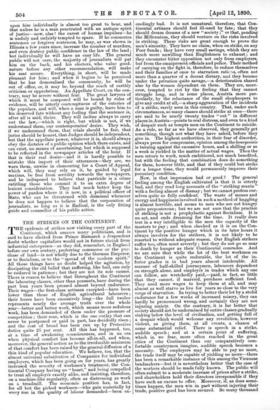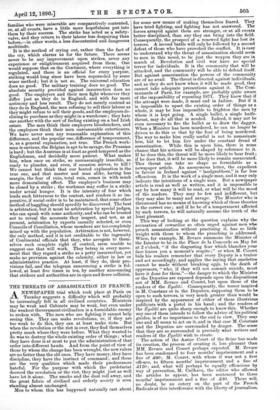THE STRIKES ON THE CONTINENT.
THE epidemic of strikes now visiting every part of the Continent, which amazes many politicians, and is said to have elicited from Prince Bismarck a despondent doubt whether capitalists would not in future shrink from industrial enterprises—as they did, remember, in England before our own century, preferring commerce or the pur- chase of land—is not wholly due to the German Emperor, or to Socialism, or to the "spread of the modern spirit." All those things have no doubt helped the agitation, by dissipating the old belief that suffering, like hail, can only be endured in patience ; but they are not its sole causes. There is reason to believe that throughout the Continent the labouring classes, other than peasants, have during the past lean years been pressed almost beyond endurance. Their wages—the first-class artisans excepted—have been lower than those of English agricultural labourers ; their hours have been excessively long—the full twelve represents nearly the average truth over the whole year—better and better work, which means more sedulous work, has been demanded of them under the pressure of competition ; their rent, which is the one outlay that can never be postponed or paid in part, has decidedly risen ; and the cost of bread has been run up by Protective duties quite 25 per cent. All this has happened, too, at a time of awakening consciousness, and in an era when physical comfort has become all-in-all, and when, moreover, the general notion as to the irreducible minimum of that comfort has been raised by the general diffusion of a thin kind of popular education. We believe, too, that the almost universal substitution of Companies for individual employers, which has been going on for years, has greatly increased the severity of workmen's treatment, the Con- tinental Company having no "heart," and being compelled to treat all employes exactly alike, and insisting, therefore, on a machine-like regularity, often as distressing as work on a treadmill. The economic position has, in fact, for all but the picked workmen—who gain materially by every rise in the quality of labour demanded—been ex- ceedingly bad. It is not unnatural, therefore, that Con- tinental artisans should feel ill-used by fate; that they should dream dreams of a new "society ;" or that, pending the Millennium, they should venture on the risks involved in striking. These risks are great enough to prove the men's sincerity. They have no claim, when on strike, on any Poor funds ; they have very small savings, which they are much more unwilling than Englishmen to exhaust ; and they encounter bitter opposition not only from employers, but from the omnipresent officials and police. Their method of carrying on the fight is, therefore, to reduce themselves and their families at once to starvation ratiens, often not more than a quarter of a decent dietary, and they become under the privation quite savage,—a deterioration shared also by the women dependent on them. They are, more- over, tempted to riot by the feeling that they cannot struggle long, and in some places, Austria more par- ticularly, by the reluctance of the small shopkeepers to give any credit at all,—a sharp aggravation of the incidents of a strike, rarely seen in this country. That, under such circumstances, so many classes should strike at once—there are said to be nearly twenty trades " out " in different places in Austria—points to real distress, and even to a kind of despair such as tempts men on the Continent to suicide. As a rule, so far as we have observed, they generally get something, though not what they have asked, before they give in. The highest authorities, in their fear of disorder, always press for compromise, opinion among the bourgeoisie is turning against the excessive hours, and a shilling or so a week is yielded in the matter of actual wages. Then the men return to work, much embittered, not much benefited, but with the feeling that combination does do something for them, however little, and that if they could but strike for a longer time, they would permanently improve their pecuniary condition.
Now, is that impression bad or good ? The general feeling among the English cultivated is that it is utterly bad, and they read long accounts of the "striking mania" with a feeling almost of dismay; but we cannot profess our- selves quite so fully confident. The waste of means and energy and happiness involved in such a method of haggling is almost horrible, and seems to men who are not hungry quite preposterous ; but we are not sure that the practice of striking is not a prophylactic against Socialism. It is an act, and ends dreaming for the time. It really does test in a way intelligible to the men the capacity of the masters to pay ; and when checked as it is on the Con- tinent by the positive hunger which in its later hours it always involves for the strikers, it is not likely to be resorted to without adequate reason. Our English strikers suffer too, often most severely ; but they do not go so near to death by hunger as their Continental comrades. And we are sure that while the lot of the best workmen on the Continent is quite endurable, the lot of the in- ferior grades is in bad years almost intolerable. All manner of half-skilled journeymen, labourers dependent on strength alone, and employes in trades which any one can follow, are wretchedly paid,—paid, in fact, so little that they cannot, if married, purchase sufficient food. They need more wages to keep them at all, and may almost as well starve as live for years so close to the very verge of starvation. In trying to better their lot by a stolid endurance for a few weeks of increased misery, they can hardly be pronounced wrong, and certainly they are not injuring society. On the contrary, it is far better that society should not be undermined by entire classes gradually sinking below the level of civilisation, and getting full of a despair which would welcome any revolution, however violent, as giving them, at all events, a chance of some substantial relief. There is speech in a strike, audible speech ; and at a certain point of suffering, which is, we fear, more often reached in the great cities of the Continent than our comparatively com- fortable countrymen imagine, audible speech becomes a necessity. The employers may be able to pay no more, the trade itself may be capable of yielding no more—there has been a remarkable instance of this among the Viennese beadmakers—but it is nevertheless better that the case of the workers should be made fully known. The public will often submit to a moderate increase of prices after a strike, and shareholders hold their directors irresponsible if they have such an excuse to offer. Moreover, if, as does some- times happen, the men win in part without injuring their trade, positive good has been secured. So many thousand families who were miserable are comparatively contented, or, at all events, have a little more hopefulness put into them by their success. The strike has acted as a safety.. valve, and they return to their labour less despairing than before,—in other words, a less discontented and dangerous multitude.
It is the method of crying out, rather than the fact of the cry, which alarms us for the future. There seems never to be any improvement upon strikes, never any experience or enlightenment acquired from them. One would suppose that on the Continent, where everything is regulated, and there is an official for every purpose, striking would long since have been superseded by some wiser method ; but it is not so. The universal education does no good. The military training does no good. The absolute security provided against insurrection does no good. The employers and their men fight whenever they differ just as they do in England, and with far more acrimony and less result. They do not merely contend as they do in England, the men refusing to sell their labour as they might refuse to sell their goods, and the employers de- clining to purchase as they might in a warehouse ; they hate one another with the sort of feeling existing on a bad Irish estate. The men think their employers bloodsuckers, and the employers think their men unreasonable extortioners. We have never seen any reasonable explanation of this difference, and the popular one, difference of temperament, is, as a general explanation, not true. The French work- man is envious, the Belgian is apt to be savage, the Prussian is hard ; but the Austrian is at least as good-tempered as the Englishman, and decidedly more patient. What makes him, when once on strike, so unreasoningly irascible, so ready to plunder, and even, if occasion serves, to kill '? We cannot but think that our hinted explanation is the true one, and that master and man alike, having less margin, the fear of ruin, total ruin, comes in with much more demoralising effect. The employer's business may be closed by a strike ; the workman may suffer in a strike under actual hunger. It is the intensity of fear which lends such bitterness to the contest, and renders it so im- perative, if social order is to be maintained, that some other method of haggling should speedily be discovered. The best is arbitration, but it must be arbitration by special judges, who can speak with some authority, and who can be trusted not to reveal the accounts they inspect, and not, as at present, arbitration by experts casually selected, or even Councils of Conciliation, whose members are too completely mixed up with the population. Arbitration is not, however, the only method, and it is not creditable to the ingenuity of Continental officials that they, who arrogate to them- selves such complete right of control, seem unable to suggest one that will work. They betray in every move- ment that they regard a strike as a petty insurrection, yet make no provision against the calamity, either in law or administrative practice. At least, if they do, their pro- visions fail, and the telegram announcing a strike is fol- lowed, at least five times in ten, by another announcing that strikers and authorities are in open and fierce collision.



































 Previous page
Previous page